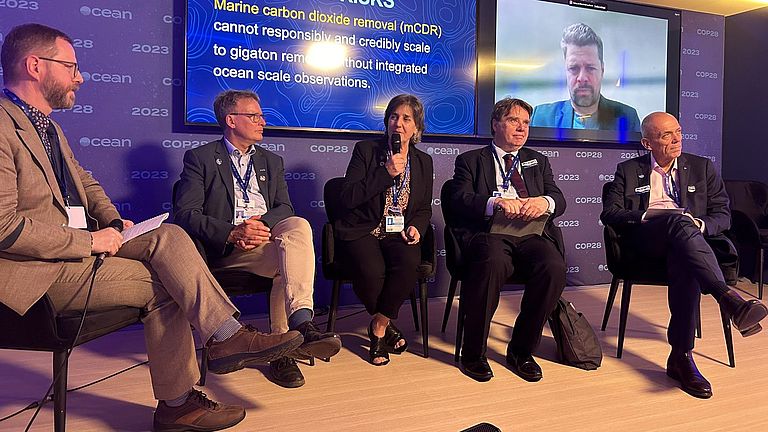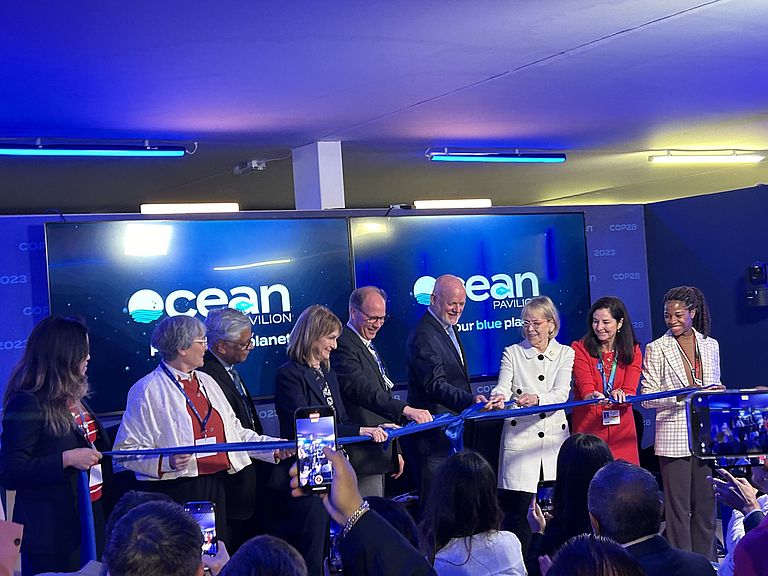Making waves for the ocean
GEOMAR researchers presented and discussed key aspects of marine science at the United Nations Climate Change Conference in Dubai
With an agreement that was celebrated as the beginning of the end of the fossil fuel era, the United Nations Climate Change Conference (COP28) closed in Dubai, United Arab Emirates, this week. In the outcome of the first global stocktake, an evaluation of the international progress made in achieving the goals laid down in the Paris Agreement, countries decided to “transitioning away from fossil fuels in energy systems, in a just, orderly and equitable manner, accelerating action in this critical decade, so as to achieve net zero by 2050 in keeping with the science”. The stocktake also recognizes that global greenhouse gas emissions need to be cut 43 per cent by 2030, compared to 2019 levels, to limit global warming to 1.5 degrees Celsius and notes that countries are not on track to meet their communicated emission reduction goals.
The marine research, conservation and sustainable use communities especially welcomed references to the ocean in the final documents of COP28. Among other aspects, countries are invited “to preserve and restore oceans and coastal ecosystems and scale up, as appropriate, ocean-based mitigation action” and encouraged to “further strengthening of ocean-based action”. It is now up to governments to fill these decisions with concrete life and increase their action on climate change together with all society and economy.
GEOMAR researchers were present at COP28 to discuss key aspects of marine science with delegations and other stakeholders, including ocean observation, approaches for marine carbon dioxide removal, ocean oxygen and digital ocean twins as a tool for science-based decision-making. For the first time, GEOMAR contributed to the Ocean Pavilion, a central hub offering more than 80 events coordinated by the Woods Hole Oceanographic Institution (WHOI) and Scripps Institution of Oceanography. Prior to COP28, the Dubai Ocean Declaration was launched by the pavilion partners with strong support from GEOMAR.
“With the Dubai Ocean Declaration, we called upon world leaders to acknowledge the ocean as a crucial factor in the fight against climate change and take decisive action. Together with activities at the Ocean Pavilion, the thematic day on nature, land use and ocean, as well as many other events and efforts of the community, it increased attention for the ocean’s invaluable services to humankind”, says GEOMAR director Professor Dr. Katja Matthes. “We therefore welcome the references to the ocean in the COP28 decision documents and will continue to contribute our knowledge to the development of effective strategies for climate change mitigation and adaptation.”
“The focus on ocean-based mitigation approaches makes clear where scientific research is crucially needed”, emphasises Professor Dr. Andreas Oschlies, Earth system modeller at GEOMAR and co-chair of the research mission Marine Carbon Sinks in Decarbonisation Pathways (CDRmare) of the German Marine Research Alliance. “It is true that, in addition to drastic reductions of greenhouse gas emissions, we need to remove a substantial amount of carbon dioxide from the atmosphere. However, the effectiveness, scalability and side effects of many of the approaches currently being discussed are not fully understood yet. Research on them needs to be transparent and coordinated carefully to avoid potential risks while speeding up knowledge generation. This is also why we launched a Best Practices Guide to Ocean Alkalinity Enhancement Research in Dubai.”
“Ocean monitoring provides an important basis for climate action, for example with respect to the carbon flux between the ocean and the atmosphere. So far, most of the carbon monitoring is being done on land – although 80 per cent of the Earth’s active carbon is stored in the ocean. In addition to measurements on research expeditions, we use a variety of other platforms to monitor these processes”, explains Dr. Toste Tanhua, marine chemist at GEOMAR, coordinator of the EuroSea and Shaping an Ocean Of Possibilities (SOOP) projects, as well as co-chair of the Global Ocean Observing System (GOOS). “At COP28, we were able to highlight the importance of sustainable ocean monitoring systems and find support for a North Atlantic Carbon Observatory that would serve as a pilot for later global implementation.”
“For political and societal decisions, we often wonder if the planned ocean interventions to mitigate or adapt to climate change work, are cost effective and desirable. Digital twins of the ocean allow us to explore the benefits and side effects of ocean interventions with the objective to maintain a healthy and resilient ocean that is crucial for our lives. At COP28, there was large interest in these applications and the Digital Twins of the Ocean programme of the United Nations Decade of Ocean Science for Sustainable Development”, reports Professor Dr. Martin Visbeck, head of the Research Unit Physical Oceanography at GEOMAR. “This is important to make justifiable decisions on the ocean we need for the future we want.”

The North Atlantic Carbon Observatory event at the COP28 Ocean Pavilion. Photo: private

Opening of the COP28 Ocean Pavilion. Photo: Andreas Oschlies, GEOMAR


